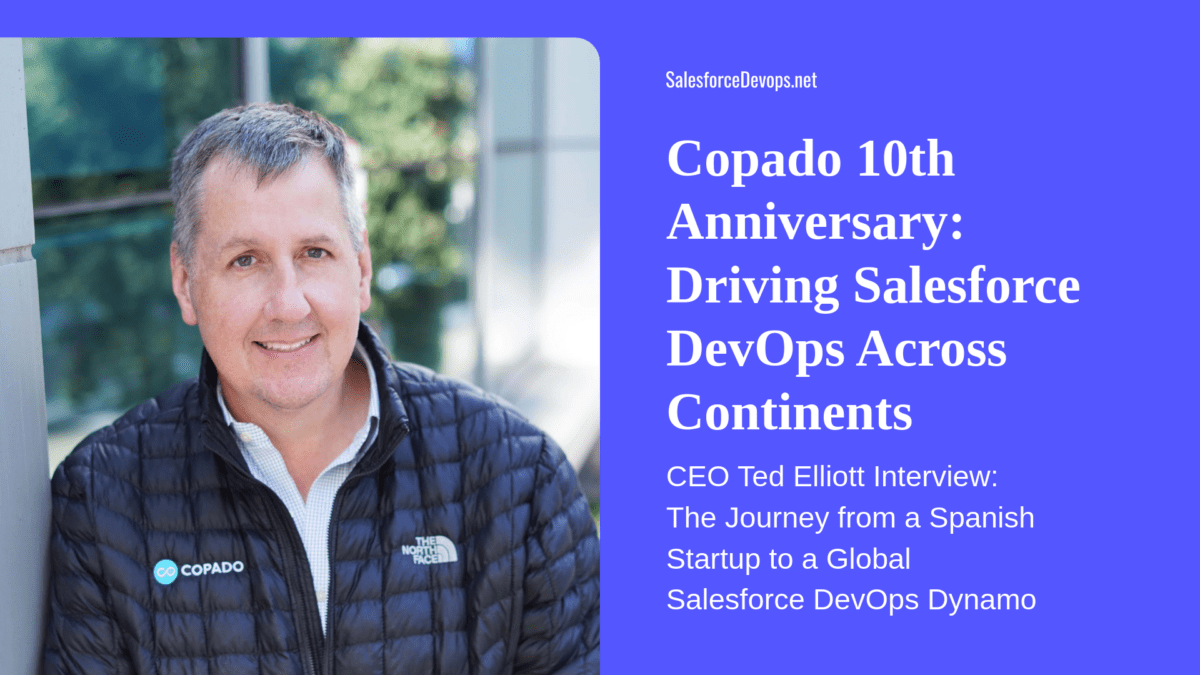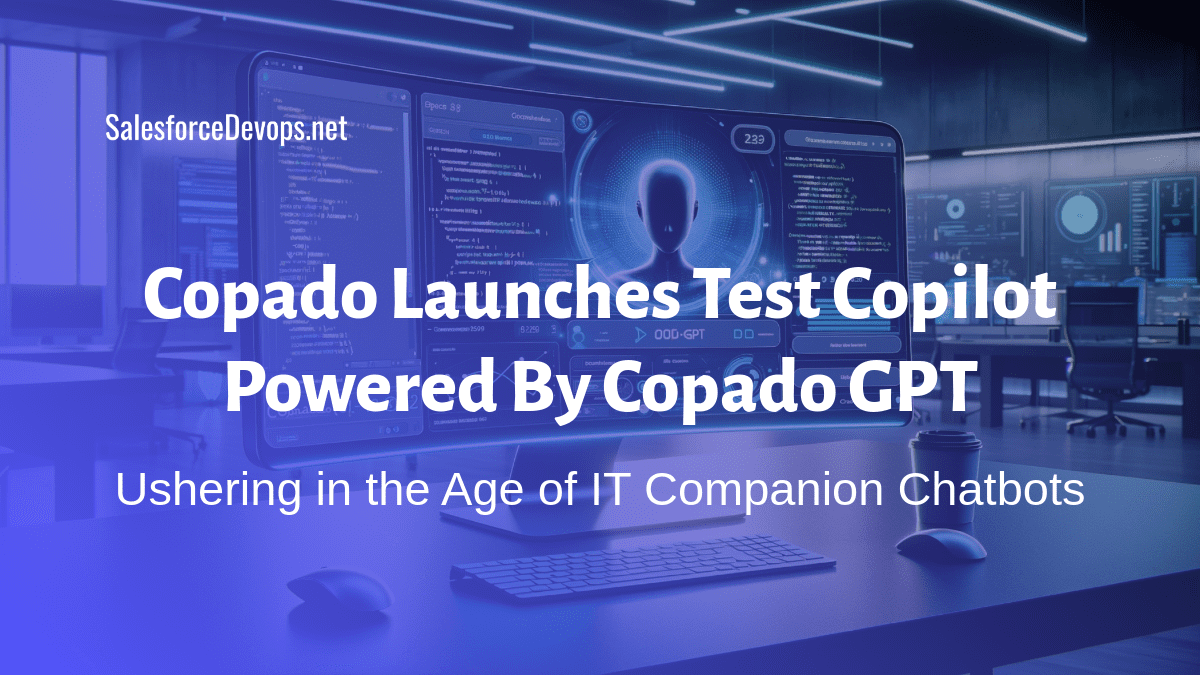Copado 10th Anniversary: Driving Salesforce DevOps Across Continents
When Ted Elliott joined Copado as CEO in 2018, one of his first priorities was to spearhead the company’s expansion beyond its European roots into the wider global, and especially North American, market. This year, Elliott realized just how successful that push has been.
For Copado’s 10th anniversary, around 400 employees from 24 countries gathered in India. For many, it was their first in-person interaction with colleagues abroad. As Elliott recalled, “It was fascinating to see the evolution and have people who usually work remotely finally meet face-to-face.” The gathering reflected Copado’s remarkable growth from a tiny Spanish startup into the world’s leading provider of DevOps solutions tailored for Salesforce.
Table of contents
- Humble Beginnings Fixing a Salesforce Pain Point
- Global Expansion and New Leadership
- Staying True to Its Roots as a Salesforce Specialist
- Empowering the People Behind Digital Transformations
- Laser Focus on High-Spending Salesforce Customers
- Pioneering AI-Driven DevOps Processes
- The Next Frontier of Salesforce DevOps Innovation
Humble Beginnings Fixing a Salesforce Pain Point
With the 10th year anniversary of Copado, CEO Ted Elliott sat down with SalesforceDevops.net to discuss the past and future of Copado and the Salesforce enterprise application development market.
Copado emerged in 2013 when founders Federico Larsen and Philipp Rackwitz became frustrated with the headaches of deploying new features and updates on the Salesforce platform. At the time, Salesforce itself offered little in terms of DevOps tooling.
So, Federico and Philipp built their own tools to bring continuous integration and delivery best practices to Salesforce. Word of their solution spread, and Copado was born. As Elliott explains, “Copado started because we wanted to make release days easier so people could go home to their families.”
In the early years, Copado was entirely self-funded. The founders bootstrapped the company to $4 million in revenue before taking any outside investment. Those first sales wins came thanks to Copado’s maniacal customer focus.
The founders intimately understood customers’ pain points because they had lived them firsthand. According to Elliott, “The way we did that was we understood the problem of Salesforce, and the problem of Salesforce is your team is generally under-resourced.” Copado built solutions to empower those resource-constrained IT teams to achieve DevOps success on Salesforce. In other words, Copado fixed real problems faced by practitioners, not theoretical ones.
Global Expansion and New Leadership
After half a decade of organic growth in Europe, Copado secured its first major funding round in 2018. The $7 million Series A round included European VC firms like Munich’s Target Partners. Flush with new capital, Copado looked to aggressively expand its global footprint, starting with entry into the United States. As part of its American push, Copado also brought on Ted Elliott as CEO.
Elliott’s experience pioneering the Salesforce ecosystem through early ISV AppExchange partners like Kieden made him an ideal leader. As Elliott himself recalls, “When I met the two founders of Copado five years ago and they explained what they were doing, I wanted to be part of it.”
Under Elliott’s leadership, Copado opened its new North American headquarters in Chicago and added offices in London, Paris, and Munich. Today North America generates around 65% of Copado’s nearly $100 million in annual recurring revenue.
The US-centric push bore fruit when Salesforce Ventures led Copado’s $140 million Series C round in 2021. The investment symbolized Copado’s ascent to the top league of Salesforce ISV partners.
Staying True to Its Roots as a Salesforce Specialist
Even as it has globalized, Copado remains zealously focused on delivering the best DevOps platform purpose-built for Salesforce customers. According to Elliott, “We are specialized for Salesforce versus taking a cloud-agnostic approach. Building expertise and best practices tailored to Salesforce users has been key.”
This extends to Copado’s website and marketing materials. Everything has a Salesforce-like feel to it, including the customer success programs.
Rather than chasing multiple platforms, Copado concentrates on mastering the intricacies of Salesforce development and releasing new innovations timed with each Salesforce release. That maniacal focus on the Salesforce ecosystem has fueled Copado’s rise to over 1,500 enterprise customers. And it has pushed net revenue retention above 115% as clients expand their use of Copado across more projects.
Empowering the People Behind Digital Transformations
From the beginning, Copado’s mission has centered around empowering people to achieve DevOps success in Salesforce. Technology enables desired outcomes like faster releases and better-quality code. But for Elliott, the real win is seeing Copado users thrive in their careers: “My greatest success at Copado is the number of people who started as admins and got promoted after adopting our platform. That tells me they went from being overlooked to making it all work.”
That commitment to upskilling carries though in Copado’s industry-leading learning program. To date over 26,500 professionals have become Certified Copado DevOps Masters.
Copado has also fostered one of the world’s largest DevOps community with over 83,000 members collaborating and sharing expertise. Elliott believes Copado’s investment in education and community engagement boosts adoption and retention.
Laser Focus on High-Spending Salesforce Customers
Despite its broad product portfolio and community engagement, Copado remains ruthlessly focused on serving Salesforce’s highest-value enterprise customers.
These are organizations spending over $1 million annually on Salesforce licenses. They often spend similarly large sums on systems integration partners.
According to Elliott, “These are customers who are doing large deployments of Vlocity, large deployments of nCino, large internal projects, digital transformation. They have gone all in on Salesforce.”
Copado prioritizes ensuring these heavyweight customers achieve success with DevOps on Salesforce. Its playbooks and best practices derive from years of experience enabling large complex deployments. The enterprise focus shows up quantitatively in Copado’s revenue mix. Says Elliott:
“Probably 700 of our 1500+ customers are on Copado Essentials. But the core strength is those million-dollar-plus Salesforce accounts. They are the customers we must repeatedly be successful for.”
By targeting major accounts, Copado is positioning itself alongside Salesforce as a strategic technology partner for digital transformation. And digital transformation concerns persist in the C-suite. Copado’s enterprise focus and track record position give it a better position versus competitors for those big deals.
Pioneering AI-Driven DevOps Processes
Never one to rest on its laurels, Copado continues to innovate even after 10 years. Case in point is the company’s aggressive push into AI-powered solutions over the past year.
In Elliott’s view, “AI is the game changer because I think all of a sudden, you’re going to allow the low code admins and full stack developers to collaborate more effectively across pipelines.”
Copado’s AI efforts kicked off last May with the launch of Copado AI Companion. Its first offering, User Story Enrichment, leverages OpenAI to help users refine requirements.
Elliott believes Copado is just scratching the surface. He envisions AI that can eventually generate test scripts, resolve merge conflicts, analyze performance data, and more. The end goal is making DevOps more accessible through automation. Copado has already secured two patents around applying AI to coding and testing. And demand exceeds expectations, with API call limits being exceeded almost daily.
The Next Frontier of Salesforce DevOps Innovation
As Copado enters its second decade, Elliott is more energized than ever by the vast possibilities still ahead:
“The future of DevOps holds immense potential, with increased automation, enhanced security practices, and multi-cloud adoption. And it will be framed by the opportunity for innovation with AI.” If the last ten years are any indication, Copado will continue leading the way in shaping the future of Salesforce DevOps. The scrappy European startup has become a global trailblazer.
Copado’s Salesforce-inspired customer success programs and its precise attention to Salesforce technology position it well. So do recent moves into AI, which accelerate Copado’s founding mission of making release days obsolete through automation. With Elliott at the helm alongside founders Larsen and Rackwitz, Copado seems poised to continue its industry dominance for larger users. For Salesforce users undertaking digital transformation, Copado promises to make the journey faster, easier, and more successful.






